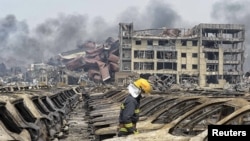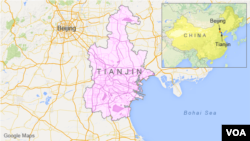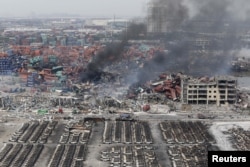China’s state media are carrying confessions from the owners of the company at the center of last week's deadly blasts in Tianjin and apologies from local officials in the northern port city.
Tianjin’s mayor has apologized and said he bears responsibility as the city’s top official for what happened. Two of the top shareholders of the company that runs the warehouses where chemicals exploded, Yu Xuewei and Dong Shexuan, who is the son of a late Tianjin port police chief, confessed in an interview with the Xinhua news agency that they used their guanxi, or connections, to obtain fire safety, land, environmental and safety certifications.
Chinese media and the public have focused on how such dangerous chemicals came to be stored in an area not far from residences.
Just days after the blasts occurred, the anti-graft agency of the Communist Party of China announced that it was investigating Yang Dongliang, the head of the country’s State Administration of Work Safety. Before rising to his current post, Yang served as a vice mayor in Tianjin for more than a decade.
According to report in the Beijing News, one of the first measures Yang Dongliang approved after stepping into office was related to the approval system for businesses working with hazardous materials. The measure states that such companies only need approval from port authorities to obtain a license.
Industry sources say such de-centralization of authority is common in China. But while it is common, it may also have opened up the door for the kind of corruption that appears to have existed in Tianjin Port.
Industry practices under scrutiny
The deadly blasts, triggered by a fire and toxic brew of volatile chemicals, are raising questions about how effectively China enforces a long list of hazardous materials that are subject to tight regulations, and whether there are other locations with similar lax policies.
The accident has raised concerns about violations of safety standards, from the testing and documenting of chemicals, to how such dangerous materials should be sealed, transported and stored.
“There are strict rules for each kind of hazardous chemical depending on its risk factor. Some have to be kept at specific temperatures and away from moisture. Some even underground,” said one industry source.
Standards violated
At daily press conferences, officials have been hesitant to assign blame or even answer basic questions about the chemical industry's legal regulations, despite repeated questions such as how the company was allowed to operate within a kilometer of residential areas in violation of national zoning laws.
Officials have confirmed that 700 tons of sodium cyanide was stored on the grounds of the company at the center of the blasts when the disaster occurred, but have said less about how that violates standards that only 10 tons can be stored in one place at a time.
At press briefings, authorities have hesitated to comment, citing that an investigation into the disaster is underway.
The central government’s State Council has established a task force to head up the investigation, which held its first meeting Wednesday.
Tight regulations, weak enforcement
The warehouse at the center of last week’s explosions is located in Tianjin's Binhai New Area.
As a newly developed economic district, the Binhai New Area has had tight regulations regarding the safety management of hazardous chemicals in place since it was set up in 2009, analysts noted.
But how carefully those regulations are enforced is already in doubt.
State media reported Tuesday the warehouse operator, Ruihai International, did not have a proper license to run a hazardous chemicals business from October of last year until June of 2015. Other safety violations have been reported in the past as well.
Analysts said that in addition to proper licensing, the training of personnel who handle such chemicals and the facilities where they are housed are also key.
“When it comes to warehousing, there’s got to be a separate design and location for storing hazardous chemicals as well as restrictions on a maximum storage quota or the strength of its walls,” said Ivan Su, a logistics professor.
Ruihai converted an ordinary warehouse and logistics center into a special storage facility for dangerous chemicals in 2012. It did not receive approval to handle dangerous chemical goods until April 2014, and that approval expired in October.
Influence peddling
So far, little is known about Ruihai’s practices on site, but already a picture of callousness and corruption is beginning to emerge.
Officials confirmed Wednesday that one of the key shareholders of the company was the son of a former police chief in Tianjin.
“This is likely a case of influence peddling. The fact that they [Ruihai] were able to turn normal warehouses into those for the storage of hazardous chemicals shows that some strings had been pulled to secure governmental approvals to do so,” professor Su said.
After China’s Premier Li Keqiang vowed to get to the bottom of the devastation on Sunday, Chinese media have suggested that as many as eight safety regulators, including public security, quality supervision, environmental protection and transport departments are likely to be held responsible.
Not in my backyard
Public concern is growing following the blasts, not only about the spread of contaminants in the water and air, but also about similar warehouses and their distance from places of residence.
In recent years, China’s public has become increasingly vocal and the “not in my backyard” movement is well underway.
Ding Xueliang, a professor of social science at Hong Kong University of Science and Technology, said the incident is likely to put a spotlight on the nation’s warehousing sector.
“Following the blasts, the warehousing sector will be under heavier scrutiny as opposition and protest used to largely target at pollution derived from the chemical reprocessing sector. From now on, more attention will be paid to the storage [of hazardous chemicals],” Ding said.
The fate of the warehousing sector will be taken into serious consideration, because Tianjin is central to a massive government project underway to turn Beijing, Tianjin and Hebei province into a mega-metropolis, housing a population of more than 110 million people.
Saibal Dasgupta also contributed to this report.








